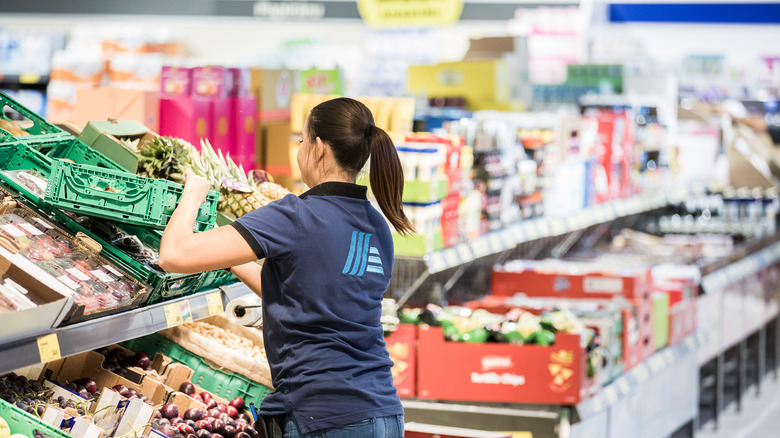Why Shopping At Aldi Might Get More Expensive Soon
With COVID cases on the decline in 2022 (according to WHO), we were all hoping that inflation would decline along with it. April Fools, because inflation is still alive and well for multiple reasons and hitting Americans particularly hard at the gas pump and grocery store. According to the United States Department of Agriculture (USDA)'s updated Economic Research service report in March, all food prices will rise by 4.5% to 5% this year and the cost of eating out will increase by 5.5% to 6.5% (via USA Today).
In addition to the existing inflation in the U.S., the price of eggs and poultry is expected to increase even more compared to other products because of an "ongoing outbreak of highly pathogenic avian influenza," via (USA Today).
Shoppers are looking for the best deals now more than ever, but even stores that are notorious for their discounted items, like Aldi, are feeling the effects of inflation.
Prices of Aldi products have already increased in Germany
Aldi was founded in 1946 by brothers Karl and Theo Albrecht and first served as a post-World War 2 discount store in Essen, Germany (via CNBC). The no-frills shopping experience they started back then still resonates with people today, but when the news broke that Aldi prices were rising in the country where it was founded, other nations began to worry. This week, the notoriously affordable products at Aldi saw a 20% to 50% price increase in its German stores, with up to 400 products at risk of being impacted by inflation (via news.com.au). According to The Limited Times, Aldi has said that the rising costs of "wheat, energy, and animal feed" due to Russia's invasion of Ukraine are to blame.
The situation in Germany has other countries like Australia concerned about rising prices, but an Aldi Australia spokesperson explained that they are in a unique situation. "Every aspect of Aldi in Australia was built to withstand inflationary pressure, from our smaller format stores to our carefully curated private label range of groceries," the spokesperson told news.com.au. There was no mention of how the U.S. will fare, but it's possible that the same price increases in Germany may be seen worldwide (excluding Australia).

